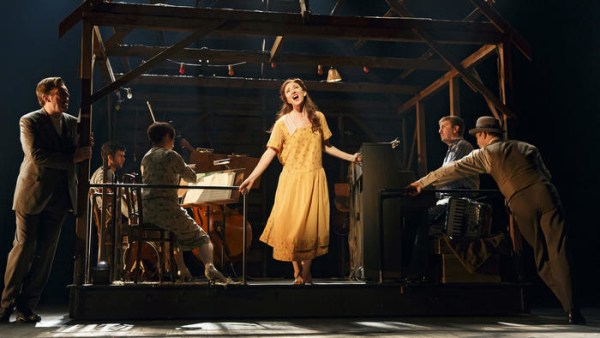Bright Star

(© Joan Marcus)
In its world premiere at San Diego's Old Globe Theatre, the new musical Bright Star boasts a who's who of theatrical lions: from director Walter Bobbie to members of the technical team to librettist and cocomposer Steve Martin — who is, in addition to his other artistic endeavors, a seasoned playwright. The only real dramatic newbie to the creative team is the folk-rock singer Edie Brickell, who has taken on cocomposer and lyricist duties here.
A largely sung-through musical, Bright Star is staged with a sure hand by Bobbie, who helms a razzle-dazzle-free production. The audience knows exactly where the show is headed, and how it will get there. While the production feels traditional, it certainly doesn't sound like any other American musical.
Set in North Carolina in 1948, Bright Star tracks Billy Cane (A.J. Shively), who returns home to Hayes Creek after the war determined to become a writer. After he pays a quick visit to his father (Stephen Bogardus) and learns of his mother's death, Billy lights out for the metropolis of Asheville where the Asheville Literary Gazette sits as a kind of beacon for his quest. The Gazette's no-nonsense editor Alice Murphy (Carmen Cusack) has a story of her own, and to learn it, we travel 22 years back to when Alice fell in love with Jimmy Ray Dobbs (Wayne Alan Wilcox), the son of the Mayor (Wayne Duvall). The Billy Cane plot is enacted onstage parallel to the Murphy-Dobbs entanglement, but eventually both story lines intersect, with select characters appearing in both periods.
Cusack, who largely carries the show, enchants both as this smart country girl who's asked to grow up too fast and the Dorothy Parker-esque editor she becomes — one who recognizes a spark of talent and initiative in young Billy. Her performance is filled with a perfect mix of warmth and sadness. Possessed of a hearty alto, Cusack maneuvers effortlessly through wistful ballads, duets, and memory songs.
Alice is bookended nicely by the men in her life. Shively taps into Billy's hunger and innocence while Wilcox steers Jimmy Ray away from being spineless. The older men of Bright Star are either evil or hugely ineffective, although Duvall has fun in the first act closing number "A Man's Gotta Do" with his hiss-inducing explanation of the lengths he would go to in order to protect his son.
Libby Winters, as Alice's guilt-ridden sister Dora, and Hannah Elless, as the bookstore clerk back in Hayes Creek who pines for Billy, each have standout moments. Stephen Bogardus as Daddy Cane and Patti Cohenour as Alice's mother, Mama Murphy, both of them high-caliber actors, are given little to do.
The real star of Bright Star is the music: a melodious melding of boot-stomping, banjo-picking bluegrass and country numbers. Under the music direction of Rob Berman and musical supervisor Peter Ashman, the score shifts comfortably between the lullaby ballad "My Baby" to the drunken reel of "Another Round" to "Sun's Gonna Shine," a touching ode to optimism sung across the decades — mother to daughter, father to son, friend to friend.
Berman's band, which is heavy on the string players, is stationed in a small exposed wooden hut that shifts around the stage. It's the centerpiece of Eugene Lee's efficient set design, which is lit in the mostly warmest of tones by Japhy Weideman.
Bobbie and his talented cast and creative team wrap Bright Star in a beautiful, ear-pleasing package. Let's hear it for old pros dabbling in new genres. This Star is on the rise.











